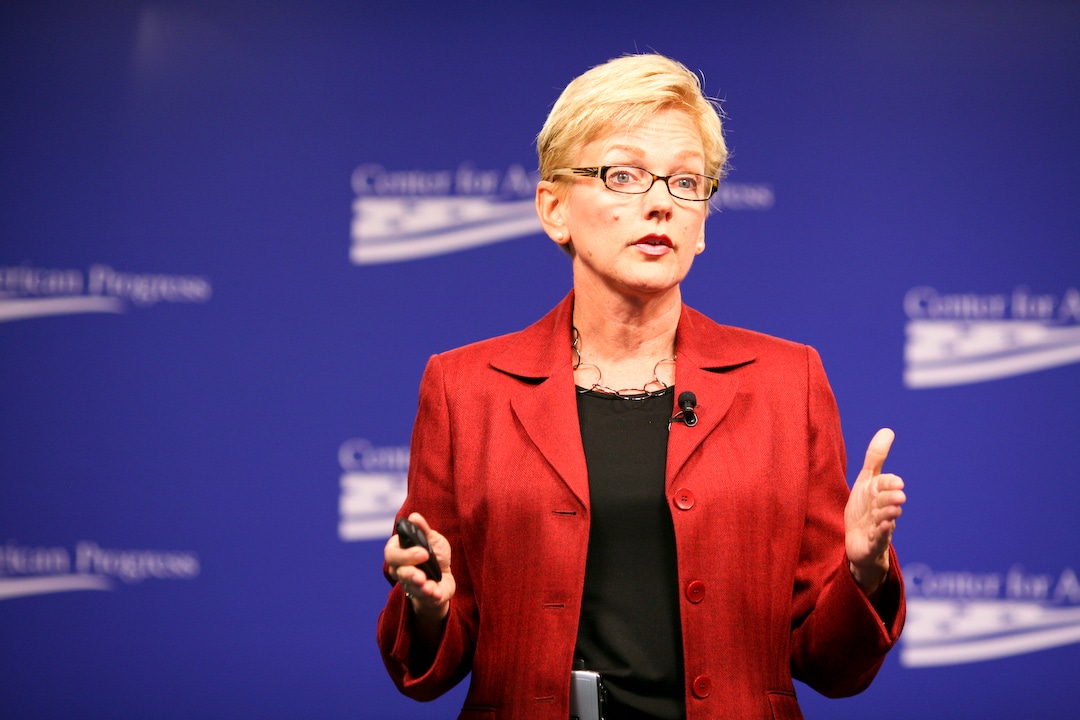In roughly two weeks, leaders from around the world will converge on Glasgow for COP26, the 26th United Nations Climate Change summit and U.S. President Joe Biden will be among them — setting the stage to further reclaim the United States’ position as an international climate leader and a willing participant in the global discourse about how to save the planet.
Since officially taking over the White House in January, which formally marked the end of the Trump presidency, the Biden administration has been bold in its promise to usher in a new era where tackling climate change head-on would be put at the center of U.S. foreign policy and national security. On Inauguration Day, Biden hit the ground running and in the following days signed a flurry of executive orders aimed at doing just that.
The U.S. rejoined the Paris climate agreement, new federal oil and gas leases were paused, fossil fuel subsidies were to be eliminated, a new governmental working group devoted to advancing projects that reduce emissions and greenhouse gases was formed, and pledges to achieve a “carbon pollution-free power sector by 2035” and put the U.S. on the path to a “net-zero economy by 2050” were made and celebrated.
In the nine months since, Biden and his cabinet of experts have gone to great lengths to review or restore so many of the environmental rules rolled back by the Trump administration. Since January, 45 Trump-era rules or decisions have been rescinded, 71 have been targeted, and 26 new ones implemented — and the impact has been real.
The administration has funneled millions toward ‘clean energy’ initiatives, including signing off on an 800-megawatt offshore wind project in Massachusetts in March and reaching agreements with California Governor Gavin Newsom to expand offshore wind development in the Pacific Ocean in May.
And a 13-year battle over the Keystone XL pipeline project, which spanned three different presidential administrations and would have carried oil sands crude from Alberta, Canada some 1,210 miles to the U.S. Gulf Coast, finally died in June after TC Energy announced it would permanently terminate the controversial project following Biden’s revocation of its federal permit six months earlier.
And yet, despite all of Biden’s promises to put in place a climate plan wherein everybody (hopefully) wins — the environment, the economy, the human race — the administration is still pandering to the industry that’s most responsible for the climate change that has charred the western U.S. all year, that’s hurled deadly floods and storms through the South and up the East Coast, and that literally set the ocean on fire in July: the fossil fuel industry.
In fact, the administration is doing more than just pandering — they’re promoting its interests as their own and attempting to secure international gas lock-in for years to come. This effort is being led by Biden appointees with major influence over the administration’s energy policies: U.S. Energy Secretary Jennifer Granholm and two senior officials at the Departments of Energy and State tasked with overseeing the role of energy in U.S. foreign policy.
Jennifer Granholm: Fossil Gas Has ‘an Important Role to Play’
Biden’s administration was expected to be a marked departure from that of his predecessor when it came to climate change, energy, and environmental policy. Prior to her confirmation as Energy Secretary, Granholm was positioned as a fresh foil for her predecessors, who each used their position to push for the expansion of natural gas and other fossil fuels. Granholm’s track record as governor of Michigan led credence to the idea that she would push the U.S. instead toward green technologies and renewable energy sources such as wind and solar.
She further promoted herself as an ardent supporter of “clean energy,” a “low carbon economy,” and a “zero-carbon future” in an op-ed published by The Detroit News just two months before Biden nominated her for the top energy job in the country.
But Granholm’s actions have so far failed to align with a “zero-carbon future.”
During her confirmation hearings in the Senate, she made it clear that fossil gas — particularly liquefied natural gas (LNG) — should have a place in the energy transition, saying that “I believe U.S. LNG exports can have an important role to play in reducing international consumption of fuels that have greater contribution to greenhouse gas emissions.”
As if natural gas, which is primarily methane — the second most abundant greenhouse gas behind carbon dioxide and a major contributor to climate change — isn’t bad for the climate. Granholm’s line that gas is cleaner ignores the fact that depending on how much methane is leaked, fossil gas can be as bad for the climate as coal. That yarn also sets the stage for preserving and expanding the global market for U.S. LNG – thus creating more long-term gas lock-in, which is really carbon lock-in, which undermines the goals of a “zero-carbon future” and gives industry what it wants: posterity.
In the months since, Granholm has touted the narrative that the fossil fuel industry just needs to “decarbonize” natural gas and cut back on methane flaring in order to be considered “clean,” setting out a vision of “tak[ing] the carbon out of the fossil fuels, but still us[ing] the fossil fuels.”
Clean hydrogen is an incredibly powerful tool for us to decarbonize our economy, tackle the climate crisis, and create good paying union jobs. On this #NationalHydrogenDay, check out my latest @ENERGY explainer 👇 pic.twitter.com/pPRoWL8yaV
— Secretary Jennifer Granholm (@SecGranholm) October 8, 2021
She has also promoted the idea that the gas industry should jump on the opportunity to produce hydrogen. While hydrogen is seen by many as a key part of the energy transition, for example in heavy industry, it can only have zero or near-zero emissions when it’s produced from renewable electricity — i.e., green hydrogen. Granholm instead has pushed to see it produced from natural gas, a process which one study has found has a carbon footprint that not only exceeds that of the natural gas itself, but can also rival that of coal.
This vision, that lies at the heart of the Biden’s administration’s energy policy, relies on unproven and eye-wateringly expensive future technologies saving the climate, while ignoring the overwhelming evidence that the only reliable way to tackle the climate crisis is to phase out the use of fossil fuels.
Andrew Light: Ensuring U.S. Gas Fills Markets Around the World
Granholm isn’t the only Biden official on this soapbox, either.
Andrew Light, the Department of Energy’s new Assistant Secretary for International Affairs, told Congress during his confirmation hearings in June that his job in that role is to “make sure that U.S. gas is competitive around the world.” He suggested that it would be his duty to out-do Russia in offering cleaner sources of fossil gas in order to ensure that U.S. gas fills “those markets around the world.” His comments sound more like those of a gas lobbyist for gas exporters than an official tasked, in part, with tackling the climate crisis.
His support for expanding U.S. LNG exports stands in contrast with his backing of the Paris climate agreement as one of its chief U.S. negotiators, and is instead a continuation of Obama-era energy policies that, among other things, pitted efforts to increase renewable energy and reduce carbon emissions against encouragement for increased fossil fuel production that led to increased carbon emissions — an “all-of-the-above” energy policy that’s now discredited.
Amos Hochstein: Fossil Gas Executive Turned Government Gas Promoter?
Amos Hochstein, the State Department’s newly appointed Senior Advisor for Energy Security and another Obama-era advisor, has also waved the U.S. fossil gas banner as a solution to climate change. He has made a career of wielding the revolving door between government and industry — most recently serving as executive vice president at Tellurian, the Texas-based gas and LNG company.
There, he apparently led a global team to secure an $8 billion investment in U.S. LNG projects while also marketing the company’s LNG to consumers in Asia, the Middle East, Europe, and South America for a hefty $620,000 annual salary. Hochstein told an interviewer at last year’s International Energy Forum that “natural gas is going to play a far greater role in the [energy] transition,” as well as for “growing economies that are moving away from coal.” Up until October of last year, Hochstein also served on the supervisory board of Naftogaz, Ukraine’s largest and state-owned producer of natural gas.
Now tasked with promoting energy security for the U.S., he’s been sounding the alarm over European reliance on Russian gas and the risk of a gas crunch in Europe — all of which are arguments which would support the case for expansion of U.S. LNG exports to Europe.
For an administration that so boldly proclaimed it was going to tackle the climate crisis and “undo the damage Trump has done,” the party line sounds a lot more like perpetuating the fossil fuel legacy it was supposed to be ending.
And for all the good that Biden and his administration have done in shifting U.S. policies and environmental protections in the face of growing climate change, those efforts will be nullified if the administration continues its pursuit of more fossil gas production and exportation in the name of tackling climate change.
Biden’s administration still has a chance to fulfill its promises and the goals of the Paris agreement, though. While these officials are backing fossil gas, others — like the administration’s climate envoy John Kerry and U.S. Secretary of State Antony Blinken — have heeded what climate science says and made it clear that gas is “not … a long-term solution” and that current economic circumstances “reinforce the need for a transition to new forms of energy, particularly sustainable energy.”
It’s not too late for Hochstein, Light, and Granholm to follow suit.
Sal Christ is senior investigator at Global Witness, an advocacy group that works “to hold companies and governments to account for their destruction of the environment, their disregard for the planet and their failure to protect human rights.”
Subscribe to our newsletter
Stay up to date with DeSmog news and alerts







